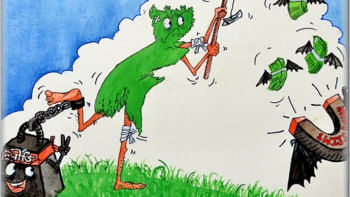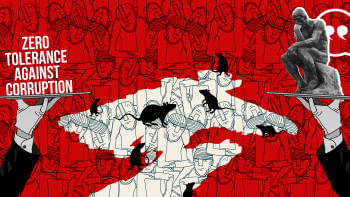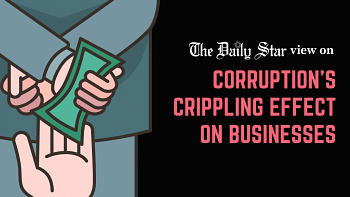How long will we play the victim card?

A predictable chain of reactions follows every year after the Transparency International releases its annual Corruption Perceptions Index (CPI). Bangladesh's invariable placement near the bottom of the index always leads to official denunciations calling it baseless or motivated, sometimes by multiple ministers. This year, the general secretary of the ruling Awami League took it up a notch, terming the global anti-graft watchdog as "BNP's agent." His subsequent comment—"Corruption is the way of life across the world now, and it is not a matter of Bangladesh only"—sounded more like a defence rather than rejection of corruption.
In the CPI 2023, Bangladesh has dropped two notches to rank 10th from the bottom among the 180 countries examined. Its score fell from 25 (out of 100) in 2022 to 24 in 2023. Among all South Asian nations, only Afghanistan has fared worse, with a rating of 20. Over the last 15 years that Awami League has been in power, these statistics with minor variations have come back to haunt us repeatedly as our public sector continued to be adjudged among the most corrupt in the world. And reactions like the above show how, beyond the obvious hurt that it causes, little substantive action has been taken to prevent this yearly dressing down of Bangladesh's performance.
The feeble attempt at political colouring belies a deeply flawed government approach. On the one hand, the official policy boasts "zero tolerance" for corruption. On the other hand, the whole governance structure seems to be designed in a way that promotes and even enables it, causing a huge drain on state resources. The message thus given is this: if you're smart or powerful enough to get away with corruption, it is okay to commit it. While the failure to address corruption seems to have benefited those close to power, it has caused massive sufferings for the public.
We get a picture of this process from how state institutions mandated to control corruption, including the Anti-Corruption Commission (ACC), have been made toothless over the years. Bribery and misappropriation of public funds have become rampant, with wilful defaulters, scammers and money launderers often given a free pass. Nepotism and partisan influence in public-sector appointments and business, including control over lucrative contracts, have been normalised, while vested interest groups have been allowed to capture policymaking.
Against this backdrop, we would like to hope that the prime minister's reiteration of the zero-tolerance vow after the recent election will indeed mean business. The local chapter of Transparency International has made a number of recommendations to improve our position that are worth following. If the government is really sincere about getting Bangladesh out of the bottom rung, rhetoric cannot help it. It must walk the talk on preventing corruption.


 For all latest news, follow The Daily Star's Google News channel.
For all latest news, follow The Daily Star's Google News channel. 











Comments